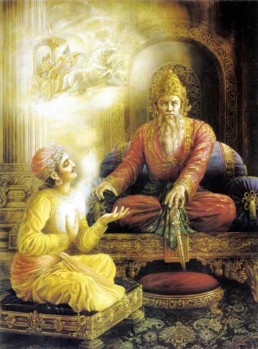Swami Chinmayananda Commentary
The argument is still continued and Arjuna points out the consequences of “caste-admixture.” When confusion of the castes has taken place, both outside in the moral life of true discipline and in one’s own inner temperament, then the family tradition gets flouted and ruined.
In the context of our discourses, we must understand that to the dead it is bread-and-water to see that their survivors maintain and continue the cultural purity that they themselves had so laboriously cultivated and inculcated into the minds of their children. In case the society squanders away its culture, so laboriously built up as a result of the slow blossoming of the social values of life through generations of careful cultivation necessarily, we will be insulting the very labours of our ancestors. It is attractive and poetic, indeed, to conceive of the dead as watching over their survivors and observing their ways of living from the balcony of their heavenly abode! It would certainly be as painful as the pains of hunger and thirst to them if they were to find that their survivors were deliberately making a jungle of their laboriously laid gardens. Understood thus, the entire stanza appears to be very appropriate.
Each generation passes down the torch of its culture to the next generation, its children, and it is for them to preserve, tend and nourish that torch and hand it over carefully to the succeeding generation, if not more, at least no less bright, than when they got it.
In India, the sages discovered and initiated a culture that is spiritual, and this spiritual culture is maintained and worked out through religious practices, and therefore, culture and religion are, to the Hindu, one and the same. Very rarely we find any mention of the term culture, as such, in our ancient literature. More often we meet with the insistence on and the mention of our religious practices.
In fact, the Hindu religion is a technique by which this spiritual culture can be maintained and worked out in the community. Therefore, we find in these stanzas, and in similar contexts, always, an enthusiastic emphasis upon the religious life, whether it be in the family or in the society. Dharma comprises those divine values-of-life by living which we manifest more and more the essential spiritual being in us. Family-Dharma (Kula-Dharma) is thus nothing but the rules of living, thinking, and acting in a united, well-planned family. By strictly following these rules we soon come to learn, in the prayer-rooms of our homes, how to live as better citizens of the Aryan-culture.
Adi Sankara Commentary
Sri Sankaracharya did not comment on this sloka. The commentary starts from 2.10.
The Bhagavad Gita with the commentary of Sri Sankaracharya – Translated by Alladi Mahadeva Sastry
Holy Geeta – Commentary by Swami Chinmayananda
The Bhagavad Gita by Eknath Easwaran – Best selling translation of the Bhagavad Gita
The Bhagavad Gita – Translation and Commentary by Swami Sivananda
Bhagavad Gita – Translation and Commentary by Bhaktivedanta Swami Prabupadha
Srimad Bhagavad Gita Chapter 1 – Verse 42 – 1.42 sankaro narakayaiva – All Bhagavad Gita (Geeta) Verses in Sanskrit, English, Transliteration, Word Meaning, Translation, Audio, Shankara Bhashya, Adi Sankaracharya Commentary and Links to Videos by Swami Chinmayananda and others – 1-42

